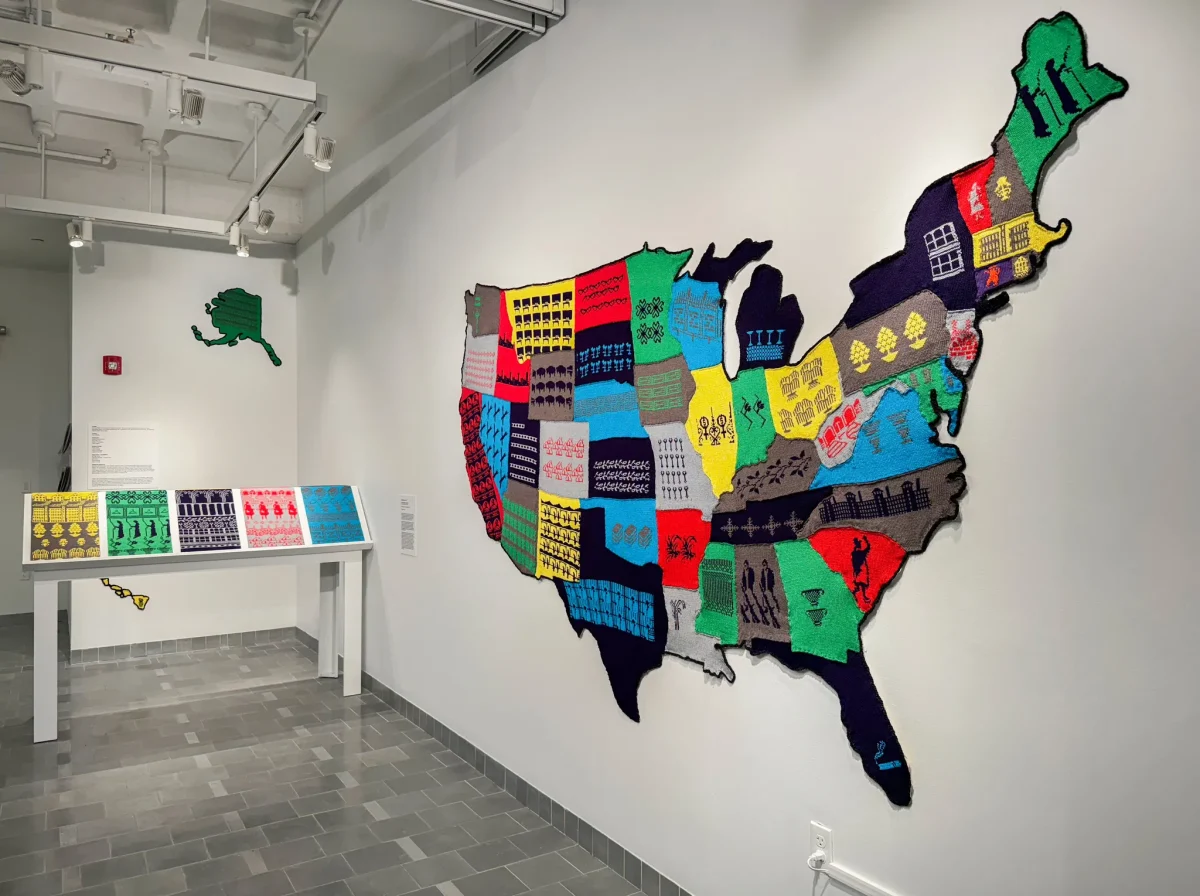
Professor Cat Mazza of the Art Department showcases her work in a gallery at Northeastern University. Photo courtesy of Cat Mazza.
In a new exhibition featured at Northeastern University, “Network,” UMass Boston arts professor Cat Mazza showcases a unique mix of textiles and technology. She uses these mediums to display a colorful history of labor movements in the United States that brought the country to where it is today.
“Network” is, in Mazza’s words, a combination of “machine knitting and custom technologies with works about labor history, global textile patterns and therapeutic communities.” She dives into social commentary with the exhibition, using the ancient art of textiles to convey her message. By mixing that art with modern technology, she has created a juxtaposition that brings attention to important issues.
One large piece in the exhibition is “Labor Sister Sampler,” which is a 10-foot wide knitted map of the United States. According to Mazza’s website, it serves as a display of the history of labor in the country; each state has its own colors and symbols that represent key moments in the labor movement. It displays various movements within the country made by women and other minority groups.
According to curators Amy Halliday and Director of the Center for the Arts, Juliana Barton, on Northeastern’s website, the technology on display was created by Mazza herself in 2004. Known as knitPro, the program takes digital images and transforms them into stitching patterns. There is also an offshoot of the program known as Knitoscope, which is used “to translate digital video into knitted animations.”
Having taught at UMass Boston since 2007, this is not Mazza’s first project in the public art space. “My most recent solo project in the Boston area was at deCordova Museum and Sculpture Park,” she wrote, “a sculpture on view called ‘Taking the Cure’ from 2018 through 2020.”
She has also worked on multiple group exhibitions, including one titlted “Disobedient Objects” back in 2014. That project was a good fit for Mazza, tackling many of the same social and activist issues highlighted in “Network.”
As for inspiration, Mazza credits her love for historical narratives and evolving craft cultural trends. She has multiple artistic inspirations in the contemporary world. “I like craft maximalists like Allyson Mitchell and Lo-fi animations by Jim Duesing,” she wrote, referencing artists who also utilize social commentary and a blend of modern tech with more tactile art forms. Mitchell, in particular, is a major influence in tactile artwork and social commentary using sculpture and film.
“Network” is located in Gallery 360 at Northeastern University. It will remain open from now until April 12, and students can enter for free anytime from 11 a.m. to 5 p.m. Monday through Saturday.
If students are interested in working with Mazza or the knitPro program, there is a workshop at Northeastern Crossing happening from 12 p.m. to 2 p.m. Feb. 27 that will give artists a tutorial on the program and its various applications. The gallery will also be hosting a panel discussion and reception for the exhibition March 21 from 4 p.m. to 7 p.m. Its closing ceremony will take place April 3 from 4:30 to 6:30 p.m.
More information about Mazza’s work can be found on her website.